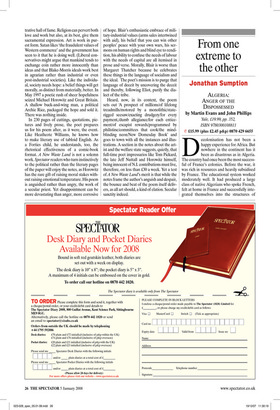From one extreme to the other
Jonathan Sumption
ALGERIA: ANGER OF THE DISPOSSESSED by Martin Evans and John Phillips Yale, £19.99, pp. 352, ISBN 9780300108811 ✆ £15.99 (plus £2.45 p&p) 0870 429 6655 Decolonisation has not been a happy experience for Africa. But nowhere in the continent has it been as disastrous as in Algeria. The country had once been the most successful of France’s colonies. Before the war, it was rich in resources and heavily subsidised by France. The educational system worked moderately well. It had produced a large class of native Algerians who spoke French, felt at home in France and successfully integrated themselves into the structures of the state. Politically, Algeria was a départment of France. There was a large European settlement, kept on top by a gerrymandered voting system. What would have happened if it had remained French into the age when such arrangements were no longer defensible? A different France perhaps.
A different Algeria certainly. It all began to go wrong with the war of independence which broke out in 1954 and continued until France conceded defeat in 1962. Colonies which have to fight for their independence have generally had a far more troubled history afterwards than those which were granted it more or less voluntarily. The problem about wars of independence is that they are rarely truly national. They tend to be fought by ambitious minorities within the indigenous population, against the hostility and indifference of the rest. Most people just want a quiet life. This spells trouble when the insurgents triumph. The victors expect a dominant position in the new state, and are usually in a position to take it by force. Zimbabwe is the nearest British analogy.
The post-independence history of Algeria is largely the story of rival groups claiming the mantle of revolution. The claims of Ben Bella and Boumédienne, who dominated the politics of the 1960s and 1970s, no doubt had some justification. But as the war of independence receded from the memory, the claims of their successors seemed more spurious. The appropriation of the revolution by the Islamist movement was perhaps the most surprising turn of all. The most wretched period of Algeria’s postwar history was the 1990s, which saw them cheated at the polls and embark upon a bloody terrorist war against the rest of the population. Successive governments, nominally civilian but in fact controlled by the military from behind the curtain, responded with indiscriminate violence, torture and political chicanery. Neutrality was not an option, and a quiet life not on offer. The educated, westernised minority, who had contributed so much to the future of their country, suffered grievously at the hands of both sides. Britain, France and the United States, terrified by the worldwide rise of Islamic violence, stood by and applauded. It is an unedifying story.
Martin Evans and John Phillips, an academic and a journalist respectively, have written a sober, somewhat dense history of modern Algeria. Despite all the jargon and acronyms, it is still the best place to find a coherent account of western Europe’s closest Islamic neighbour. The travails of Algeria are little known and less understood in England. But with Algerians making up some five per cent of the population of France, and a larger proportion of Europe’s Islamic terrorists, they are not easy to ignore.
The discount offers on books in this section remain open for three months from date of publication.



















































 Previous page
Previous page